Analysing Field and Tenor in Two Texts
VerifiedAdded on 2023/03/21
|8
|1696
|33
AI Summary
This document analyzes the field and tenor in two texts. It explores the language features, register, and genre of each text. The first text is a conversation between two girls discussing their fathers' retirement, while the second text is a letter from a principal to parents about the dangers of illegal parking near schools. The document provides insights into the social purpose and nature of the relationship in each text.
Contribute Materials
Your contribution can guide someone’s learning journey. Share your
documents today.
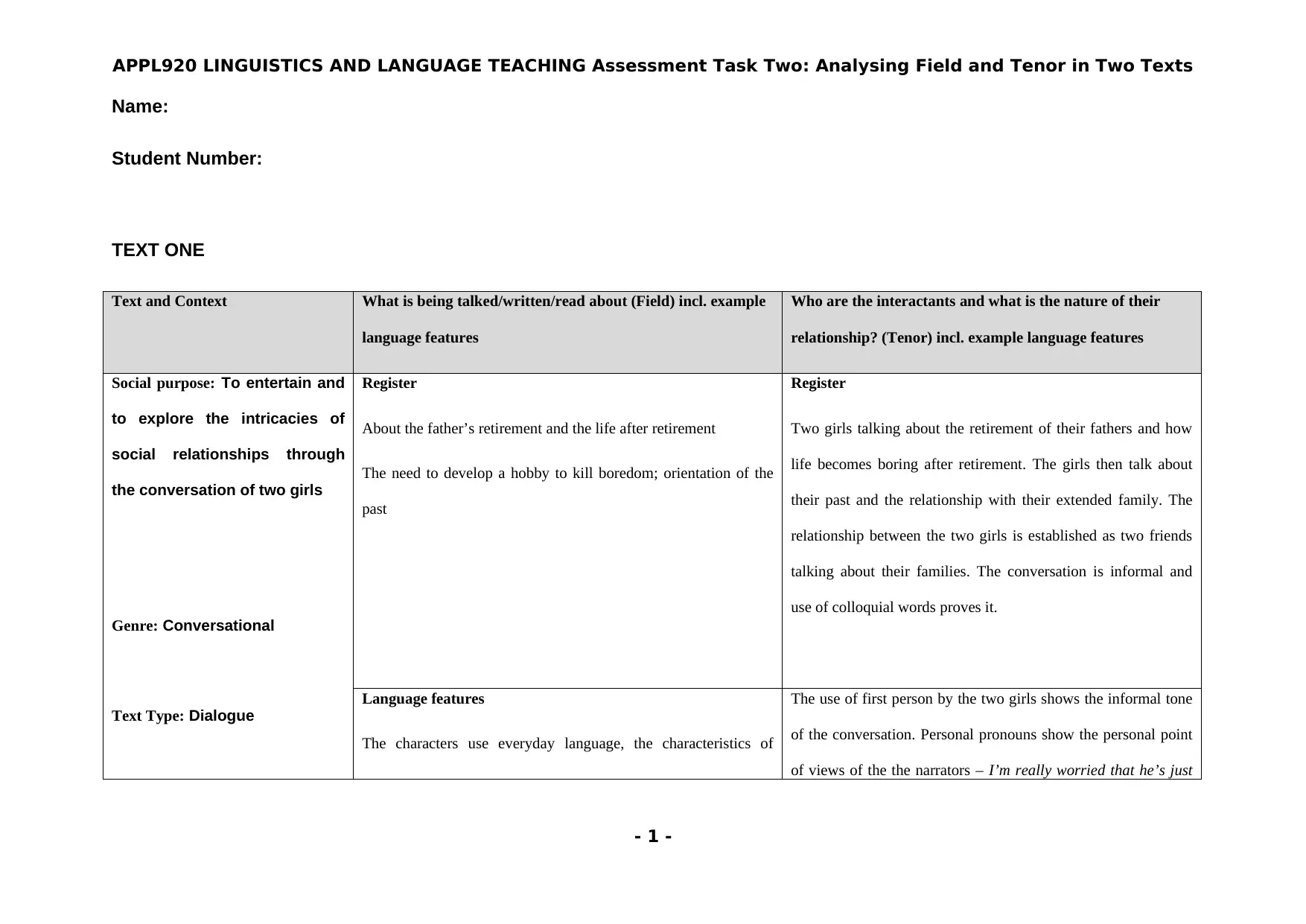
APPL920 LINGUISTICS AND LANGUAGE TEACHING Assessment Task Two: Analysing Field and Tenor in Two Texts
Name:
Student Number:
TEXT ONE
Text and Context What is being talked/written/read about (Field) incl. example
language features
Who are the interactants and what is the nature of their
relationship? (Tenor) incl. example language features
Social purpose: To entertain and
to explore the intricacies of
social relationships through
the conversation of two girls
Genre: Conversational
Text Type: Dialogue
Register
About the father’s retirement and the life after retirement
The need to develop a hobby to kill boredom; orientation of the
past
Register
Two girls talking about the retirement of their fathers and how
life becomes boring after retirement. The girls then talk about
their past and the relationship with their extended family. The
relationship between the two girls is established as two friends
talking about their families. The conversation is informal and
use of colloquial words proves it.
Language features
The characters use everyday language, the characteristics of
The use of first person by the two girls shows the informal tone
of the conversation. Personal pronouns show the personal point
of views of the the narrators – I’m really worried that he’s just
- 1 -
Name:
Student Number:
TEXT ONE
Text and Context What is being talked/written/read about (Field) incl. example
language features
Who are the interactants and what is the nature of their
relationship? (Tenor) incl. example language features
Social purpose: To entertain and
to explore the intricacies of
social relationships through
the conversation of two girls
Genre: Conversational
Text Type: Dialogue
Register
About the father’s retirement and the life after retirement
The need to develop a hobby to kill boredom; orientation of the
past
Register
Two girls talking about the retirement of their fathers and how
life becomes boring after retirement. The girls then talk about
their past and the relationship with their extended family. The
relationship between the two girls is established as two friends
talking about their families. The conversation is informal and
use of colloquial words proves it.
Language features
The characters use everyday language, the characteristics of
The use of first person by the two girls shows the informal tone
of the conversation. Personal pronouns show the personal point
of views of the the narrators – I’m really worried that he’s just
- 1 -
Secure Best Marks with AI Grader
Need help grading? Try our AI Grader for instant feedback on your assignments.
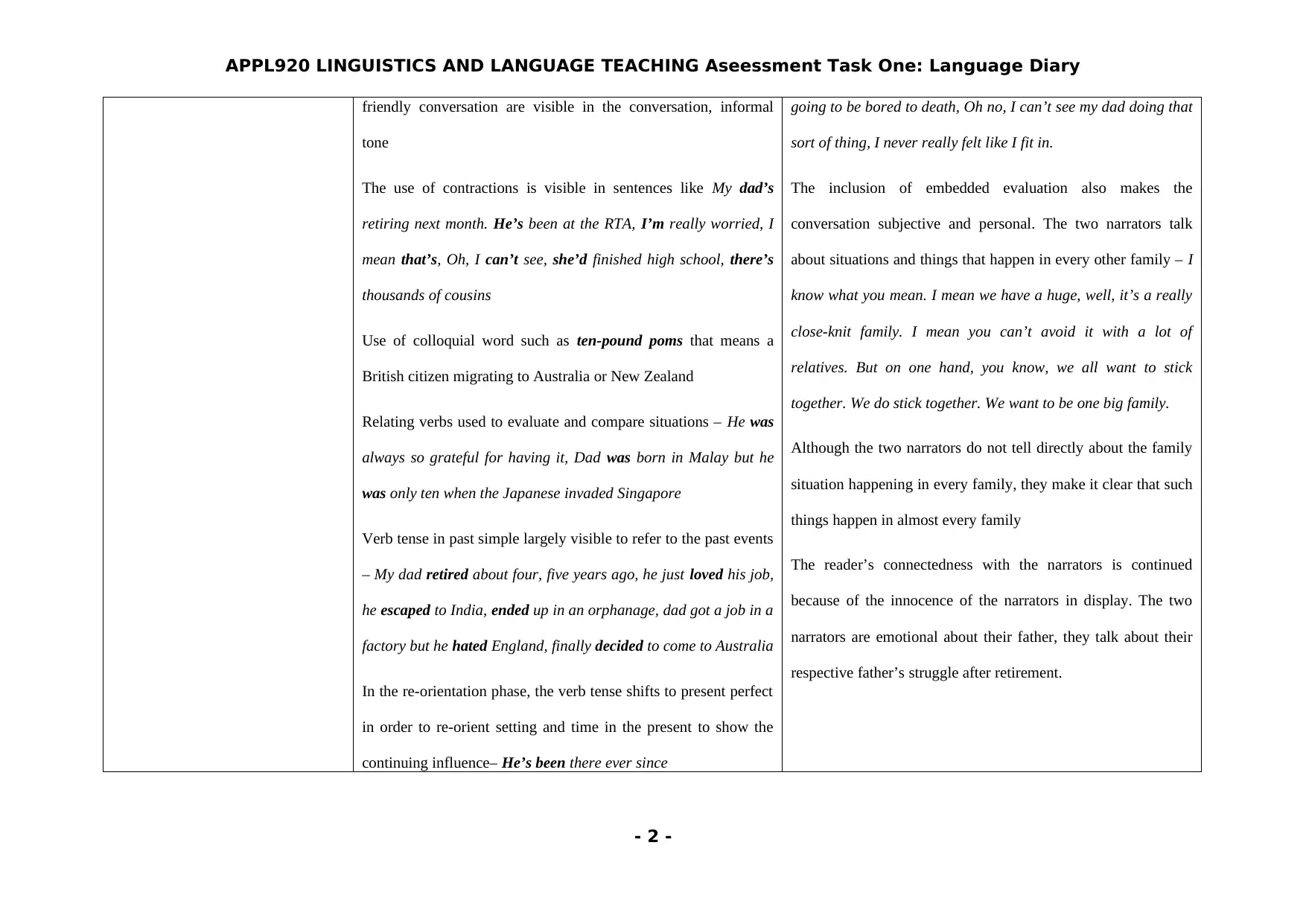
APPL920 LINGUISTICS AND LANGUAGE TEACHING Aseessment Task One: Language Diary
friendly conversation are visible in the conversation, informal
tone
The use of contractions is visible in sentences like My dad’s
retiring next month. He’s been at the RTA, I’m really worried, I
mean that’s, Oh, I can’t see, she’d finished high school, there’s
thousands of cousins
Use of colloquial word such as ten-pound poms that means a
British citizen migrating to Australia or New Zealand
Relating verbs used to evaluate and compare situations – He was
always so grateful for having it, Dad was born in Malay but he
was only ten when the Japanese invaded Singapore
Verb tense in past simple largely visible to refer to the past events
– My dad retired about four, five years ago, he just loved his job,
he escaped to India, ended up in an orphanage, dad got a job in a
factory but he hated England, finally decided to come to Australia
In the re-orientation phase, the verb tense shifts to present perfect
in order to re-orient setting and time in the present to show the
continuing influence– He’s been there ever since
going to be bored to death, Oh no, I can’t see my dad doing that
sort of thing, I never really felt like I fit in.
The inclusion of embedded evaluation also makes the
conversation subjective and personal. The two narrators talk
about situations and things that happen in every other family – I
know what you mean. I mean we have a huge, well, it’s a really
close-knit family. I mean you can’t avoid it with a lot of
relatives. But on one hand, you know, we all want to stick
together. We do stick together. We want to be one big family.
Although the two narrators do not tell directly about the family
situation happening in every family, they make it clear that such
things happen in almost every family
The reader’s connectedness with the narrators is continued
because of the innocence of the narrators in display. The two
narrators are emotional about their father, they talk about their
respective father’s struggle after retirement.
- 2 -
friendly conversation are visible in the conversation, informal
tone
The use of contractions is visible in sentences like My dad’s
retiring next month. He’s been at the RTA, I’m really worried, I
mean that’s, Oh, I can’t see, she’d finished high school, there’s
thousands of cousins
Use of colloquial word such as ten-pound poms that means a
British citizen migrating to Australia or New Zealand
Relating verbs used to evaluate and compare situations – He was
always so grateful for having it, Dad was born in Malay but he
was only ten when the Japanese invaded Singapore
Verb tense in past simple largely visible to refer to the past events
– My dad retired about four, five years ago, he just loved his job,
he escaped to India, ended up in an orphanage, dad got a job in a
factory but he hated England, finally decided to come to Australia
In the re-orientation phase, the verb tense shifts to present perfect
in order to re-orient setting and time in the present to show the
continuing influence– He’s been there ever since
going to be bored to death, Oh no, I can’t see my dad doing that
sort of thing, I never really felt like I fit in.
The inclusion of embedded evaluation also makes the
conversation subjective and personal. The two narrators talk
about situations and things that happen in every other family – I
know what you mean. I mean we have a huge, well, it’s a really
close-knit family. I mean you can’t avoid it with a lot of
relatives. But on one hand, you know, we all want to stick
together. We do stick together. We want to be one big family.
Although the two narrators do not tell directly about the family
situation happening in every family, they make it clear that such
things happen in almost every family
The reader’s connectedness with the narrators is continued
because of the innocence of the narrators in display. The two
narrators are emotional about their father, they talk about their
respective father’s struggle after retirement.
- 2 -
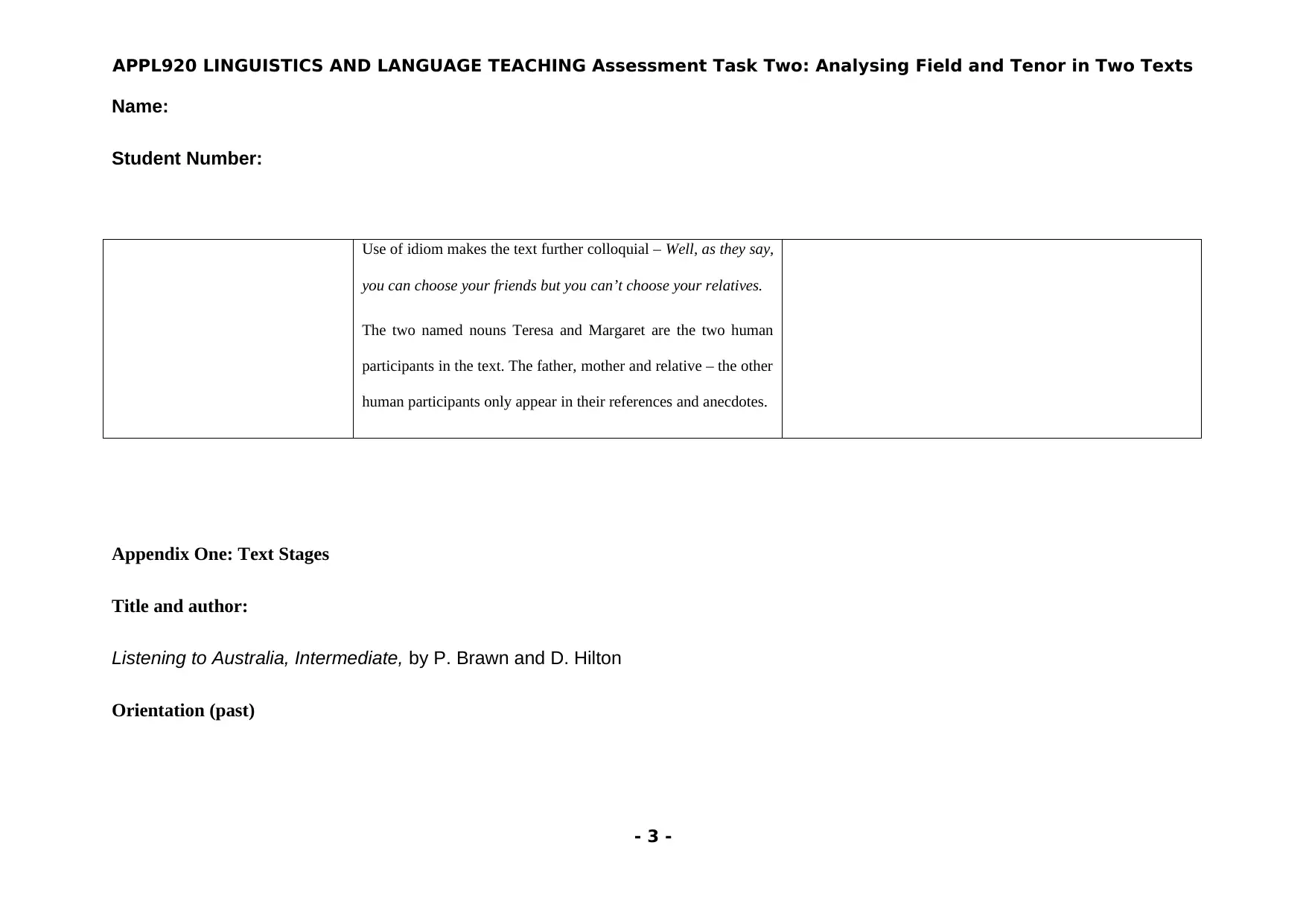
APPL920 LINGUISTICS AND LANGUAGE TEACHING Assessment Task Two: Analysing Field and Tenor in Two Texts
Name:
Student Number:
Use of idiom makes the text further colloquial – Well, as they say,
you can choose your friends but you can’t choose your relatives.
The two named nouns Teresa and Margaret are the two human
participants in the text. The father, mother and relative – the other
human participants only appear in their references and anecdotes.
Appendix One: Text Stages
Title and author:
Listening to Australia, Intermediate, by P. Brawn and D. Hilton
Orientation (past)
- 3 -
Name:
Student Number:
Use of idiom makes the text further colloquial – Well, as they say,
you can choose your friends but you can’t choose your relatives.
The two named nouns Teresa and Margaret are the two human
participants in the text. The father, mother and relative – the other
human participants only appear in their references and anecdotes.
Appendix One: Text Stages
Title and author:
Listening to Australia, Intermediate, by P. Brawn and D. Hilton
Orientation (past)
- 3 -
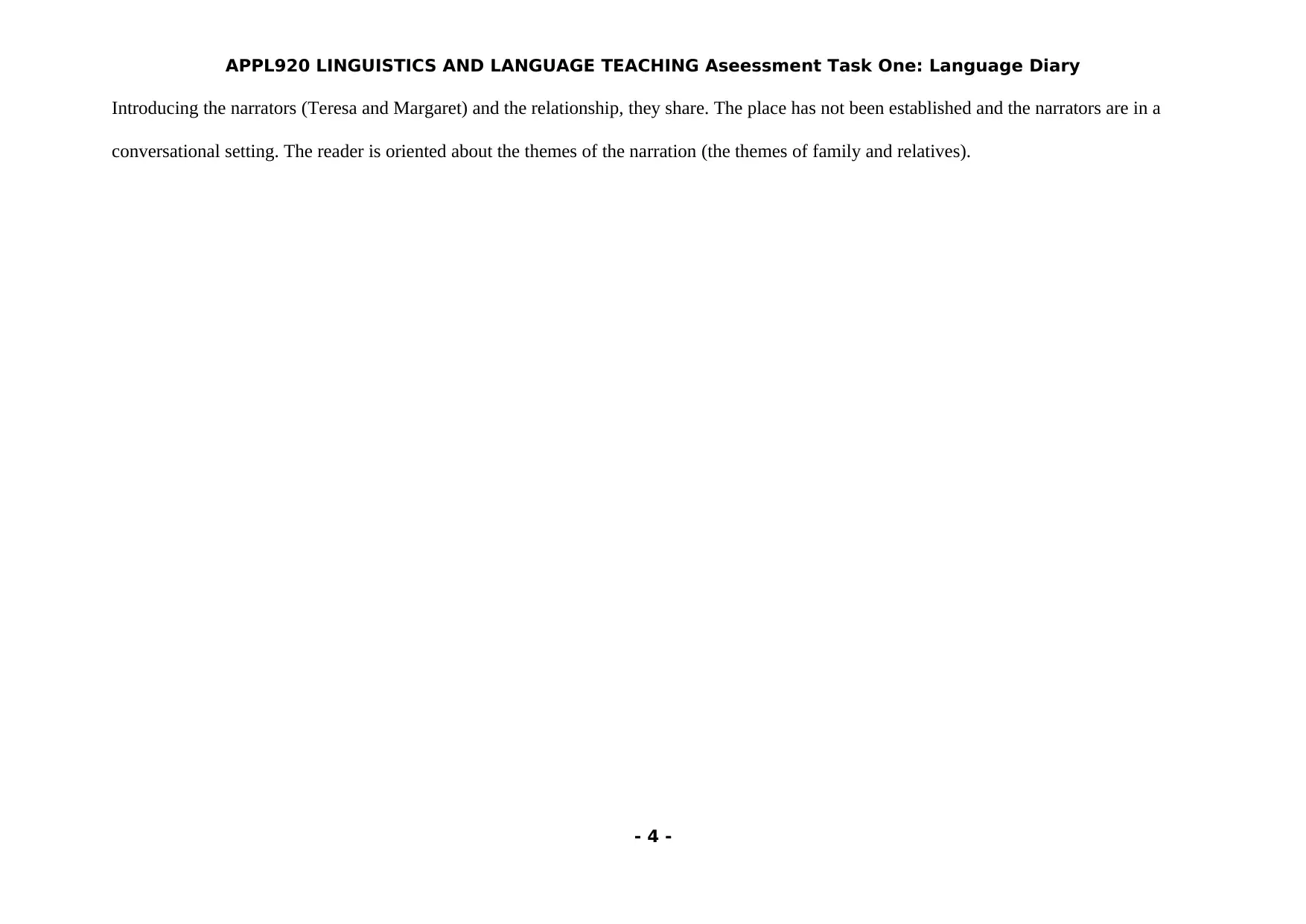
APPL920 LINGUISTICS AND LANGUAGE TEACHING Aseessment Task One: Language Diary
Introducing the narrators (Teresa and Margaret) and the relationship, they share. The place has not been established and the narrators are in a
conversational setting. The reader is oriented about the themes of the narration (the themes of family and relatives).
- 4 -
Introducing the narrators (Teresa and Margaret) and the relationship, they share. The place has not been established and the narrators are in a
conversational setting. The reader is oriented about the themes of the narration (the themes of family and relatives).
- 4 -
Secure Best Marks with AI Grader
Need help grading? Try our AI Grader for instant feedback on your assignments.
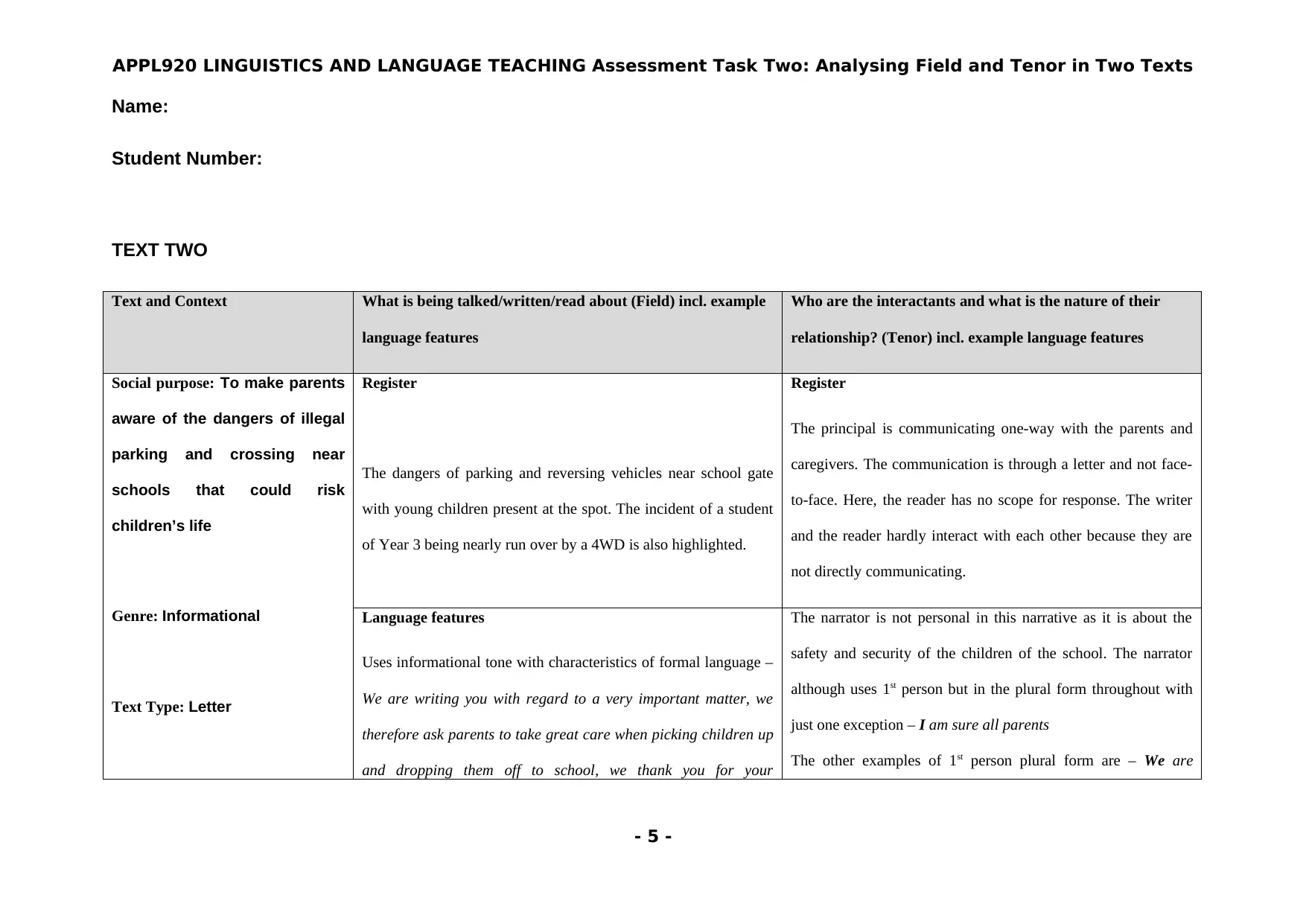
APPL920 LINGUISTICS AND LANGUAGE TEACHING Assessment Task Two: Analysing Field and Tenor in Two Texts
Name:
Student Number:
TEXT TWO
Text and Context What is being talked/written/read about (Field) incl. example
language features
Who are the interactants and what is the nature of their
relationship? (Tenor) incl. example language features
Social purpose: To make parents
aware of the dangers of illegal
parking and crossing near
schools that could risk
children’s life
Genre: Informational
Text Type: Letter
Register
The dangers of parking and reversing vehicles near school gate
with young children present at the spot. The incident of a student
of Year 3 being nearly run over by a 4WD is also highlighted.
Register
The principal is communicating one-way with the parents and
caregivers. The communication is through a letter and not face-
to-face. Here, the reader has no scope for response. The writer
and the reader hardly interact with each other because they are
not directly communicating.
Language features
Uses informational tone with characteristics of formal language –
We are writing you with regard to a very important matter, we
therefore ask parents to take great care when picking children up
and dropping them off to school, we thank you for your
The narrator is not personal in this narrative as it is about the
safety and security of the children of the school. The narrator
although uses 1st person but in the plural form throughout with
just one exception – I am sure all parents
The other examples of 1st person plural form are – We are
- 5 -
Name:
Student Number:
TEXT TWO
Text and Context What is being talked/written/read about (Field) incl. example
language features
Who are the interactants and what is the nature of their
relationship? (Tenor) incl. example language features
Social purpose: To make parents
aware of the dangers of illegal
parking and crossing near
schools that could risk
children’s life
Genre: Informational
Text Type: Letter
Register
The dangers of parking and reversing vehicles near school gate
with young children present at the spot. The incident of a student
of Year 3 being nearly run over by a 4WD is also highlighted.
Register
The principal is communicating one-way with the parents and
caregivers. The communication is through a letter and not face-
to-face. Here, the reader has no scope for response. The writer
and the reader hardly interact with each other because they are
not directly communicating.
Language features
Uses informational tone with characteristics of formal language –
We are writing you with regard to a very important matter, we
therefore ask parents to take great care when picking children up
and dropping them off to school, we thank you for your
The narrator is not personal in this narrative as it is about the
safety and security of the children of the school. The narrator
although uses 1st person but in the plural form throughout with
just one exception – I am sure all parents
The other examples of 1st person plural form are – We are
- 5 -
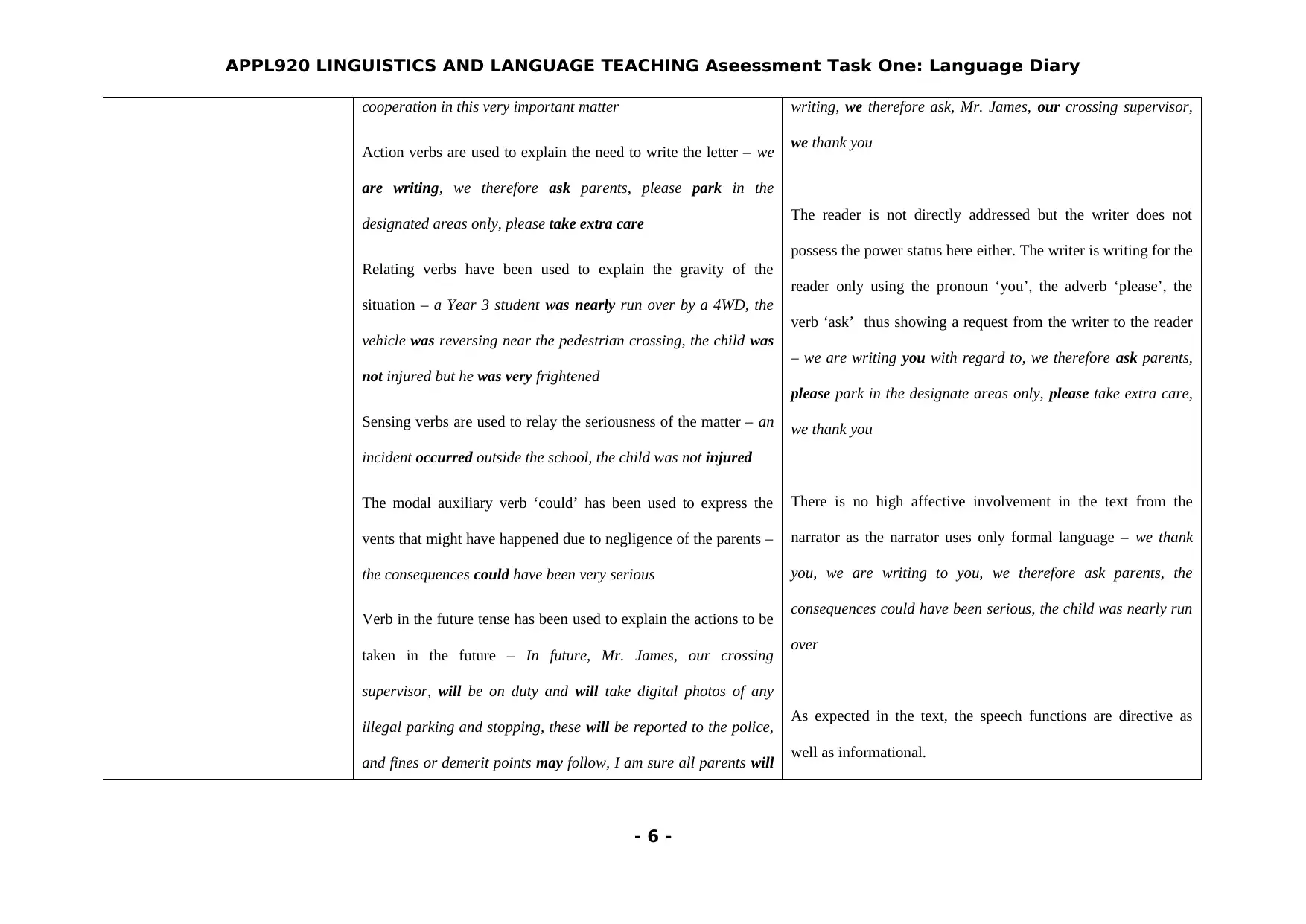
APPL920 LINGUISTICS AND LANGUAGE TEACHING Aseessment Task One: Language Diary
cooperation in this very important matter
Action verbs are used to explain the need to write the letter – we
are writing, we therefore ask parents, please park in the
designated areas only, please take extra care
Relating verbs have been used to explain the gravity of the
situation – a Year 3 student was nearly run over by a 4WD, the
vehicle was reversing near the pedestrian crossing, the child was
not injured but he was very frightened
Sensing verbs are used to relay the seriousness of the matter – an
incident occurred outside the school, the child was not injured
The modal auxiliary verb ‘could’ has been used to express the
vents that might have happened due to negligence of the parents –
the consequences could have been very serious
Verb in the future tense has been used to explain the actions to be
taken in the future – In future, Mr. James, our crossing
supervisor, will be on duty and will take digital photos of any
illegal parking and stopping, these will be reported to the police,
and fines or demerit points may follow, I am sure all parents will
writing, we therefore ask, Mr. James, our crossing supervisor,
we thank you
The reader is not directly addressed but the writer does not
possess the power status here either. The writer is writing for the
reader only using the pronoun ‘you’, the adverb ‘please’, the
verb ‘ask’ thus showing a request from the writer to the reader
– we are writing you with regard to, we therefore ask parents,
please park in the designate areas only, please take extra care,
we thank you
There is no high affective involvement in the text from the
narrator as the narrator uses only formal language – we thank
you, we are writing to you, we therefore ask parents, the
consequences could have been serious, the child was nearly run
over
As expected in the text, the speech functions are directive as
well as informational.
- 6 -
cooperation in this very important matter
Action verbs are used to explain the need to write the letter – we
are writing, we therefore ask parents, please park in the
designated areas only, please take extra care
Relating verbs have been used to explain the gravity of the
situation – a Year 3 student was nearly run over by a 4WD, the
vehicle was reversing near the pedestrian crossing, the child was
not injured but he was very frightened
Sensing verbs are used to relay the seriousness of the matter – an
incident occurred outside the school, the child was not injured
The modal auxiliary verb ‘could’ has been used to express the
vents that might have happened due to negligence of the parents –
the consequences could have been very serious
Verb in the future tense has been used to explain the actions to be
taken in the future – In future, Mr. James, our crossing
supervisor, will be on duty and will take digital photos of any
illegal parking and stopping, these will be reported to the police,
and fines or demerit points may follow, I am sure all parents will
writing, we therefore ask, Mr. James, our crossing supervisor,
we thank you
The reader is not directly addressed but the writer does not
possess the power status here either. The writer is writing for the
reader only using the pronoun ‘you’, the adverb ‘please’, the
verb ‘ask’ thus showing a request from the writer to the reader
– we are writing you with regard to, we therefore ask parents,
please park in the designate areas only, please take extra care,
we thank you
There is no high affective involvement in the text from the
narrator as the narrator uses only formal language – we thank
you, we are writing to you, we therefore ask parents, the
consequences could have been serious, the child was nearly run
over
As expected in the text, the speech functions are directive as
well as informational.
- 6 -
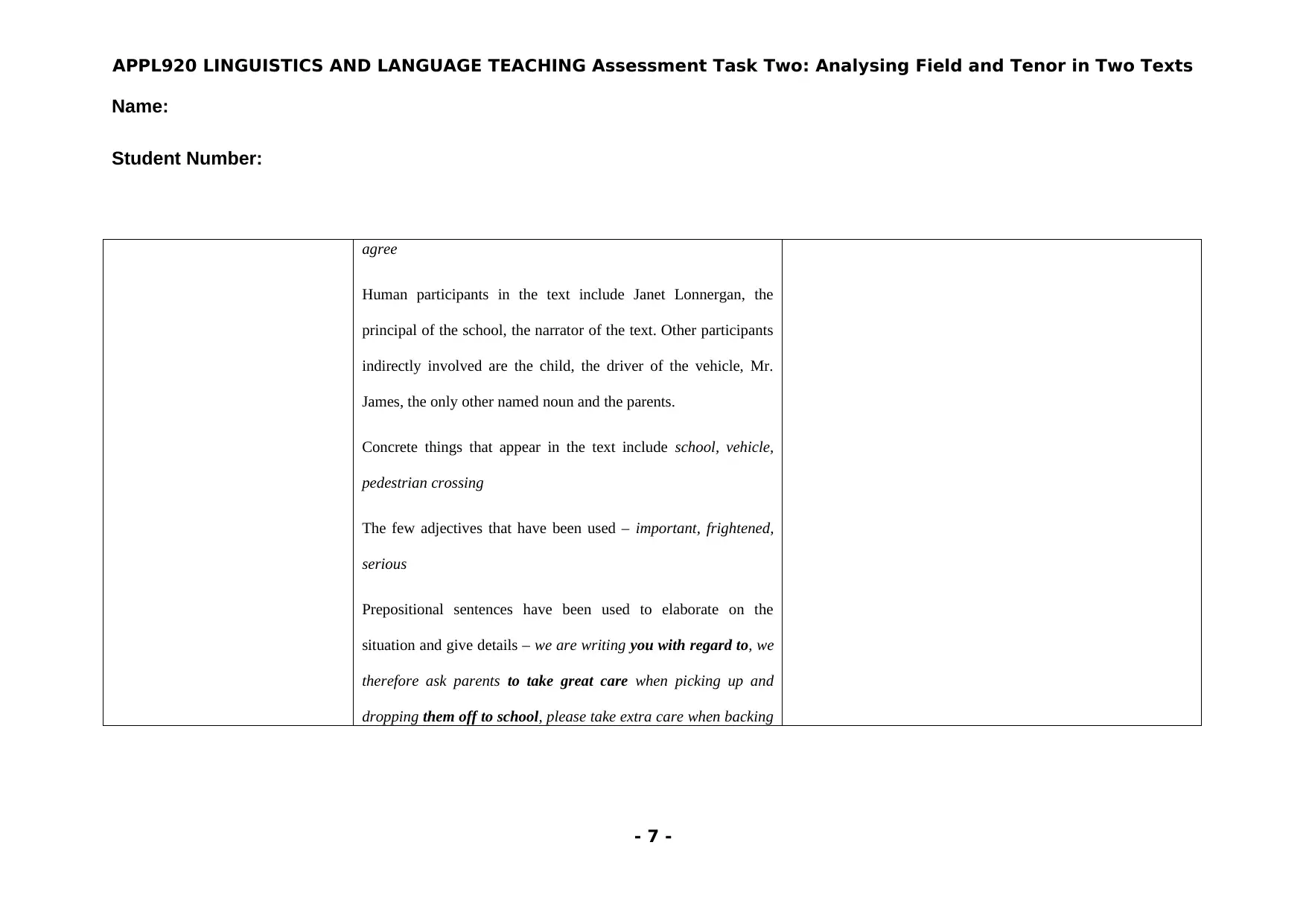
APPL920 LINGUISTICS AND LANGUAGE TEACHING Assessment Task Two: Analysing Field and Tenor in Two Texts
Name:
Student Number:
agree
Human participants in the text include Janet Lonnergan, the
principal of the school, the narrator of the text. Other participants
indirectly involved are the child, the driver of the vehicle, Mr.
James, the only other named noun and the parents.
Concrete things that appear in the text include school, vehicle,
pedestrian crossing
The few adjectives that have been used – important, frightened,
serious
Prepositional sentences have been used to elaborate on the
situation and give details – we are writing you with regard to, we
therefore ask parents to take great care when picking up and
dropping them off to school, please take extra care when backing
- 7 -
Name:
Student Number:
agree
Human participants in the text include Janet Lonnergan, the
principal of the school, the narrator of the text. Other participants
indirectly involved are the child, the driver of the vehicle, Mr.
James, the only other named noun and the parents.
Concrete things that appear in the text include school, vehicle,
pedestrian crossing
The few adjectives that have been used – important, frightened,
serious
Prepositional sentences have been used to elaborate on the
situation and give details – we are writing you with regard to, we
therefore ask parents to take great care when picking up and
dropping them off to school, please take extra care when backing
- 7 -
Paraphrase This Document
Need a fresh take? Get an instant paraphrase of this document with our AI Paraphraser
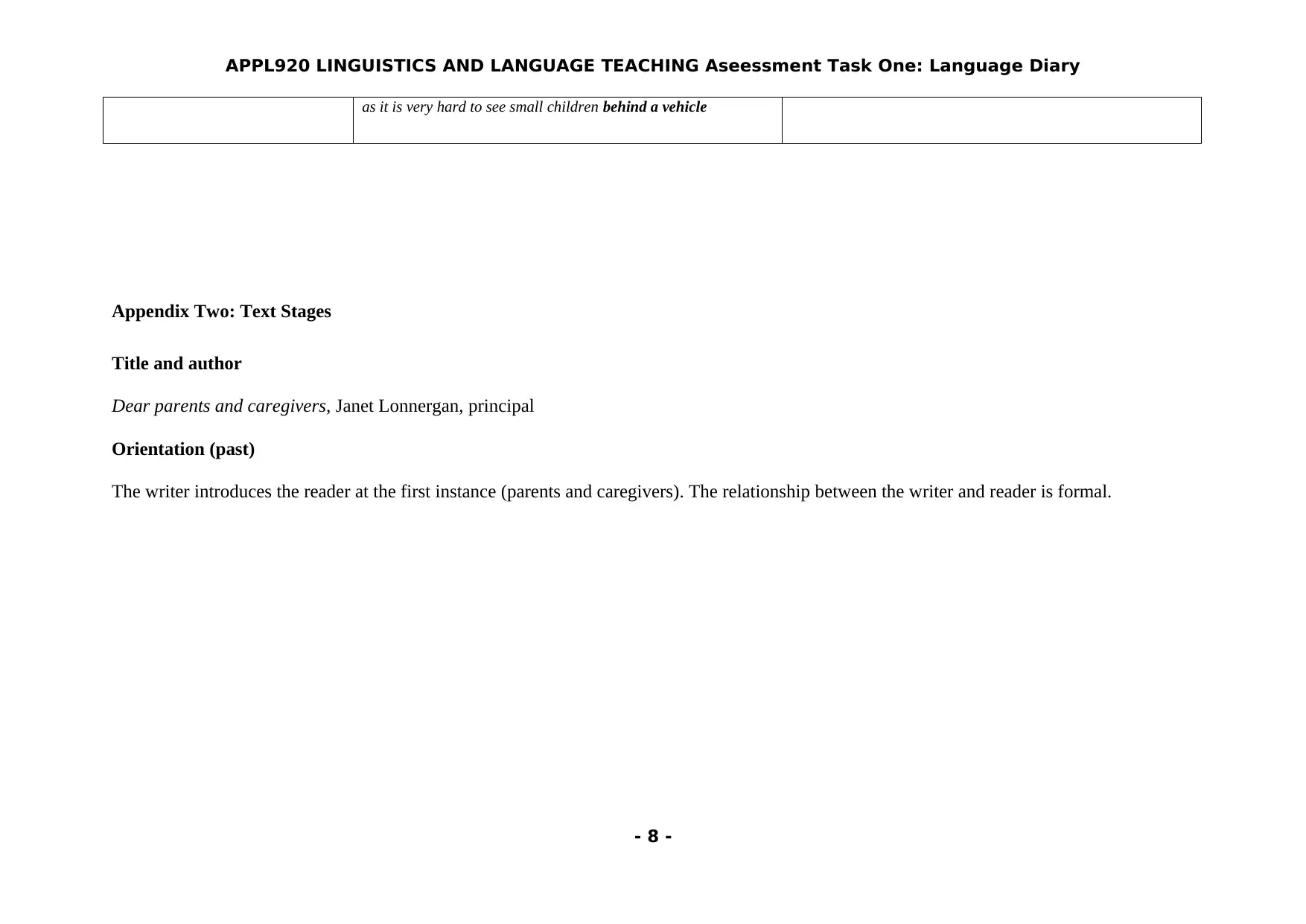
APPL920 LINGUISTICS AND LANGUAGE TEACHING Aseessment Task One: Language Diary
as it is very hard to see small children behind a vehicle
Appendix Two: Text Stages
Title and author
Dear parents and caregivers, Janet Lonnergan, principal
Orientation (past)
The writer introduces the reader at the first instance (parents and caregivers). The relationship between the writer and reader is formal.
- 8 -
as it is very hard to see small children behind a vehicle
Appendix Two: Text Stages
Title and author
Dear parents and caregivers, Janet Lonnergan, principal
Orientation (past)
The writer introduces the reader at the first instance (parents and caregivers). The relationship between the writer and reader is formal.
- 8 -
1 out of 8
Your All-in-One AI-Powered Toolkit for Academic Success.
+13062052269
info@desklib.com
Available 24*7 on WhatsApp / Email
![[object Object]](/_next/static/media/star-bottom.7253800d.svg)
Unlock your academic potential
© 2024 | Zucol Services PVT LTD | All rights reserved.